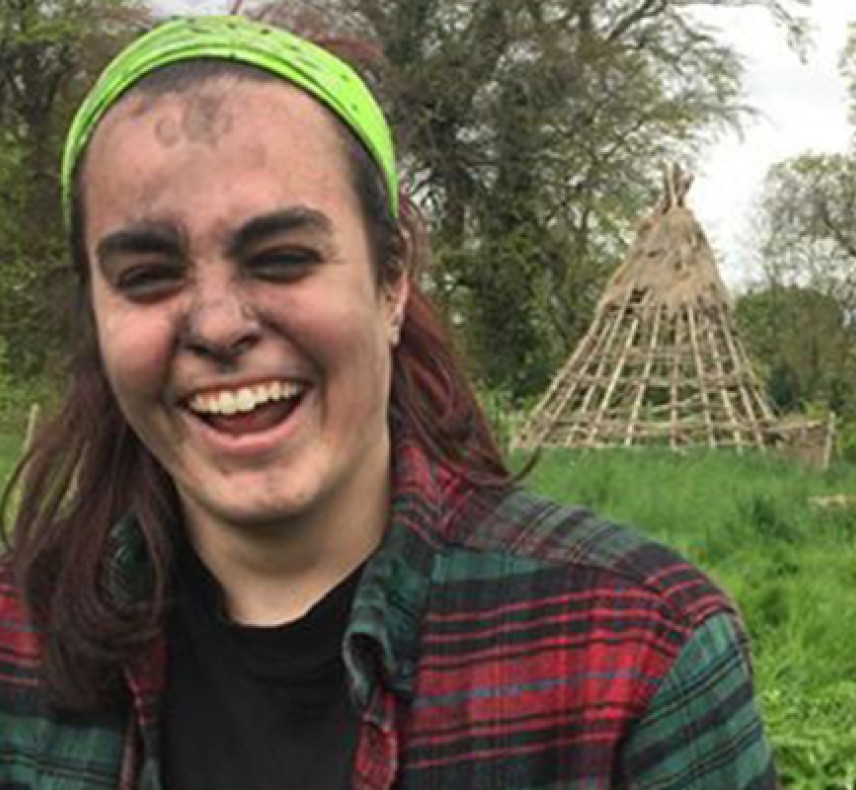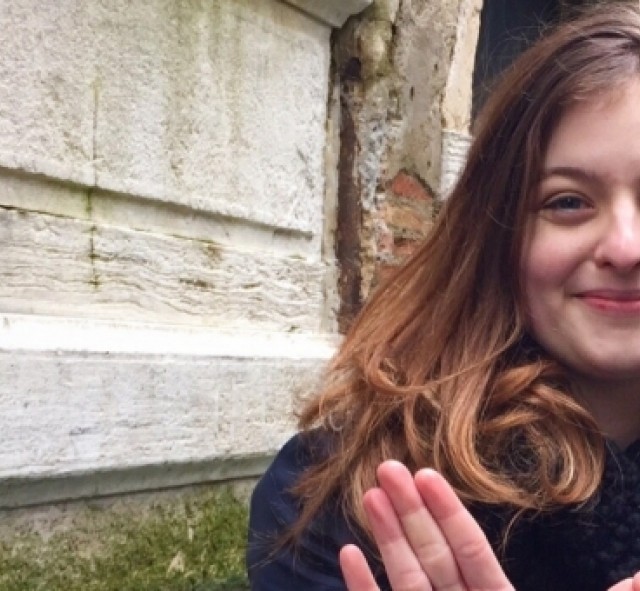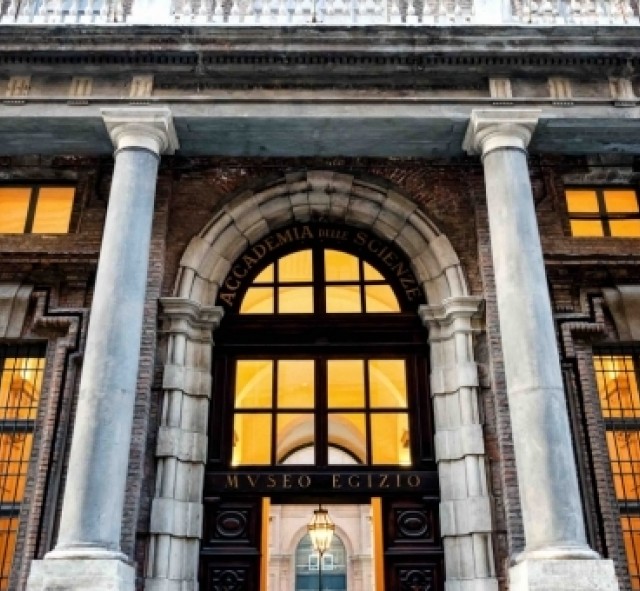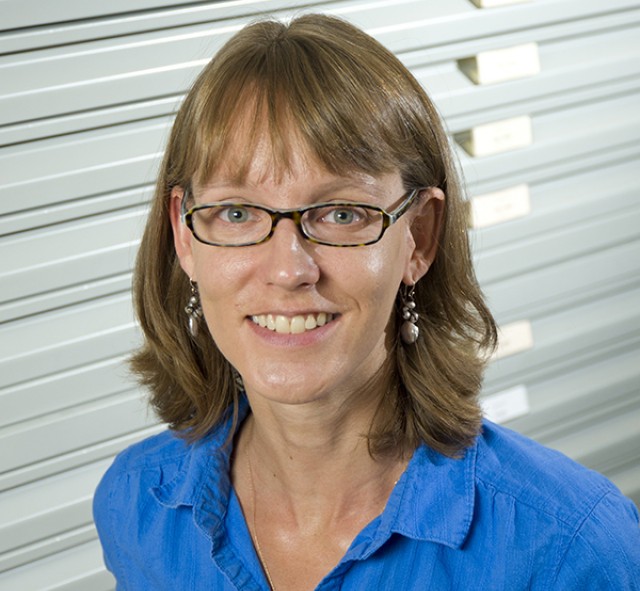Caitlin Lobl wants to encourage others never to give up on their passion.
Lobl, a native of Springfield, graduated from Wittenberg in 2016 with a major in history and minors in archaeology, pre-modern and ancient world studies (PAST), and music. Although some might question the job prospects for such a combination, Lobl is making things happen for herself.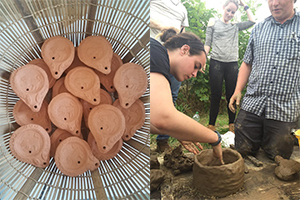
“If anyone is considering going down a path that might not seem like the easiest option (i.e. archaeology), you shouldn't be afraid to try. I am at my happiest when I am working in the field. If it is your passion, you should go for it and not regret trying,” said Lobl, who opted to enter a graduate program in the archaeology field.
Lobl recently completed her dissertation while studying at the University College Dublin (UCD) School of Archaeology in Ireland at the Centre for Experimental Archaeology and Material Culture.
"Caitlin's willingness to explore archaeology took her to a newly formed program in experimental archaeology,” said Darlene Brooks Hedstrom, Wray Chair in the Humanities, professor of history, department chair and the director of archaeology at Wittenberg. “This is new research that brings science and history together as archaeologists test out various experiments to recreate materials made in the past. I am so proud of Caitlin's work at UCD, and honestly a little jealous that such a program did not exist when I was a graduate student. Her training provides her with a unique skill set most archaeologists do not have."
“It is a real joy to see how Caitlin's passion for archaeology developed over her four years at Wittenberg and then to see her as a graduate student with her own lab in Dublin,” Brooks Hedstrom added. “In part, the success of the new archaeology program was enhanced by her willingness to work on the campus archaeology project and entice other students to check out archaeology as an engaging way to study the past.”
The college allows its students to explore not only the archaeology and environments of Ireland and Great Britain, but also of northwest Europe, the Mediterranean, North America, and East and Southeast Asia. Lobl’s 15,000-word paper had to be heavily influenced by an archaeological experiment. She completed the project in mid-August and hopes to graduate this December.
“I decided to go back to Ireland after spending two summers working at the Black Friary Community Heritage Project as an archaeological teaching assistant and intern in Trim, Ireland,” said Lobl, who received a grant the second summer to take part in the project.
Field directors Denis Shine and Fin O'Carroll were very helpful to Lobl when suggesting archaeological master’s programs. With their references, along with Brooks Hedstrom’s, Lobl applied and was accepted to UCD.
“I really enjoyed being able to live abroad for a year,” said Lobl, who was the treasurer and president of the archaeology club and the treasurer of Wittenberg University Speleological Society during her time on campus. She was also the recipient of the Nancy L. Benco Archaeological Research Fund award in both 2014 and 2015. “There are many parts that stand out to me. I found that I was able to grow as an adult, and I relied less on others and more on myself. Also, I met so many amazing and supportive friends. We all struggled and succeeded together. We had a genuine group of scholars interested in the accomplishments of one another.”
Lobl’s graduate pursuit focused on experimental archaeology and material culture. Her research provides hypotheses on artifacts, features and structures.
“The personal research portion of my graduate program began with the conclusion of semester classes in May,” she said. “My project focused on the life cycle of Roman oil lamps based off of the finds from Colchester (a historic town in Essex, England). I had three main chapters. The first chapter focused on the production of the lamps and tested the quality of two-piece molds when producing the lamps. The second chapter examined various aspects of lamp functionality. The primary question tested whether the type of oil chosen as the fuel impacted the output of light and three different oils were tested (olive oil, linseed oil and goose fat). Additionally, I tested different natural fibers to explore what a wick might have been made of then. This test was more exploratory due to the fact that wicks do not survive archaeologically. The final chapter tested the deposition of the two-piece molds and the oil lamps. Archaeologically, the two-piece mold does not commonly survive.”
Lobl’s final experiment was based on a hypothesis on three oil lamps uncovered in a cremation feature by the Colchester archaeologists. Based on the positions within the feature, Lobl said that it is hypothesized that the lamps were used to ignite the cremation pyre.
“In order to test this, I built a pyre out of wood and filled it with kindling,” she said. “I placed the three lamps on top of the pyre and three lamps within the pyre. While lamps could have been used to light the pyre, it is unlikely based on how they were oxidized/reduced.”
Lobl hopes to continue to be a part of projects like this in a career in field archaeology.
“I would like to work in the field for a few years and pay off some of my loans before attempting to obtain a Ph.D.,” said Lobl, who is thankful to Wittenberg professors Brooks Hedstrom and Christian Raffensperger, associate professor and director of pre-modern and ancient world studies and the Russian and Central Eurasian program at Wittenberg.
“The most obvious and important factor Wittenberg played in leading me to this career path involved the professors in the history department and the art history department. Dr. Brooks Hedstrom served as an advisor and archaeological mentor starting the second semester of my freshman year. After I took her field methods summer course, my fate was set. She pushed and challenged me to become the student and archaeologist I am. Additionally, Dr. Raffensperger has provided nothing but support and kindness. They have continued to support me even after I graduated from Wittenberg.”
Raffensperger misses seeing Lobl around Wittenberg, but is proud of her post-graduate accomplishments.
“One of the most amazing parts of being a professor at Wittenberg is seeing what our students do after Wittenberg, and becoming friends with these amazing people that we are privileged to teach,” he said. “She was not only a good student, but she was a constant reliable presence in the history department. However, as much as I may miss her at Witt, I was so glad to see her at UCD this summer. Her graduate school experience really allowed her inner archeologist and scholar to shine.”


